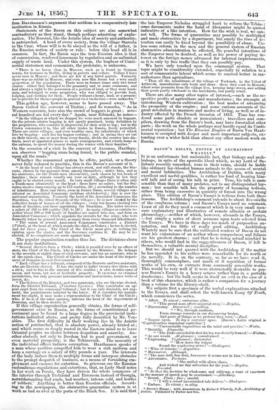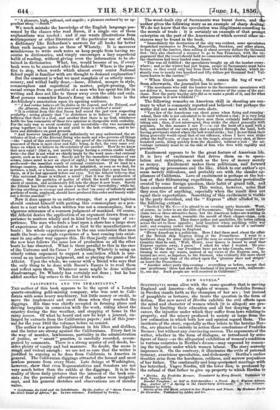BACON'S RESSATS, EDITED BY ARCHBISHOP WIT A T LT. * IT
is an unfortunate but undeniable fact, that bishops and arch- bishops, in spite of the apostolic blood which, as my Lord of fia- lisblny recently remarked, runs in their veins, should be liable like ordinary lay-blooded human animals to the access of mental and moral infirmities. The Archbishop of Dublin, with many excellent and useful qualities, is rather too fond of hearing him- self talk and of seeing his talk in print. True, his talk is more sensible than that of many prelates, not to say distinguished lay- men; but sensible talk has the property of becoming tedious, either from being excessive in quantity or forced into the wrong
i place. This edition of Bacon's Essays is tedious from both these reasons. The Archbishop's comment extends to about five-sixths of the cumbrous volume ; and Bacon's Essays need no comment. Least of all do they need a comment which is in very small mea- sure explanatory and illustrative of remote allusion or archaic phraseology,—neither of which, however, abounds in the Essays, —but simply a series of short sermons upon texts selected from the Essays. " We have in these days too much of purposeless an- notation, and too little of really good editing. Archbishop Whately may be sure that the cultivated readers of Bacon do not want his expansions of an author whose compactness and fulness are his greatest charms ; and that he is doing actual mischief to others, who would find in the suggestiveness of Bacon, if left to themselves, a valuable mental discipline. But we should not quarrel with the Archbishop if the matter he has appended to his author were remarkable for its worth or its novelty. It is, on the contrary, so far as we have read it, thoroughly commonplace, and much of it repetition of former works of his own, or extracts from commonly accessible works. This would be very well if it were abstractedly desirable to pos- sess Bacon's Essays in a heavy octavo rather than in a portable duodecimo ; but the bulk seems in itself an evil in the case of a book of this character, which is rather a companion for a journey than a volume for the library-shelf.
We subjoin first a specimen of the verbal explanations attached to the Essays, and shall select the well-known Essay Of Truth., which commences the series.
" Affect. To aim at; endeavour after.
"'This proud man affects imperial sway2—.Dryden. "Discoursing. Discursive ; rambling. " 'We, through madness, Form strange conceits in our discoursing brains,
And prate of things as we pretend they were.'—Ford.
"Impose upon. To lay a restraint upon. (Bacon's Latin original is Cogitationibus imponitur captivitas.') " Unreasonable impositions on the mind and practice.'— Watts. "Daintily.. Elegantly. " The Duke exceeded in that his leg was daintily formed.'—WotiOn. "As one would. At pleasure ; unrestrained. " Unpleasing. Unpleasant ; distasteful. "'How dares thy tongue -Sound the unpleasing news ?'—Shakevere. "'Wine of demons.'—Augustine. "Howsoever. Although. " ' The man cloth fear God, howsoever it seems not in him.'—Shakespere. " Adventures. Fortunes.
' She smiled with silver cheer,
And wished me fair adventure for the year.'—Dryden. "So. Provided.
" So that the doctrine be wholesome and edifying, a want of exactness in the manner of speech may maybe overlooked.'—.ettterbury. " Round. .Plain; fair; candid. " will a round unvarnished tale deliver.'—Shalmpere. " Embase. To vitiate; to alloy.
Bacon's Essays : with Annotations by Richard Whately,D.D., Ambbishoy
Dublin. Published by Parker and Son.
" A pleasure, high, rational, and angelic; a pleasure embaaed by no ap- pendant sting.'—South."
We much mistake the knowledge of the English language pos- sessed by the classes who read Bacon, if a single one of these explanations was needed ; and if one wants illustrations from contemporary or other literature of the particular use of words, a dictionary like Richardson's answers for all books far better than such meagre notes as these of Whately. It is moreover mischievous to write such notes as keep people from having re- course to dictionaries and simply encourages a lazy superficial habit of reading, without giving even the information to be ob- tained in dictionaries. What, too, would become of us, if every book were to be annotated after this fashion? Where is the prac- tice to stop, when words which almost every senior National School pupil is familiar with are thought to demand explanation?,
But the comment is what we most complain of as utterly unne- eessary, and withal badly done,—loose, diluted, meagre in style, commonplace and superficial in matter, pulpit-prosmg, the casual scraps from the portfolio of a man who has spent his life in writing and does not like to throw away even the odds and ends. Most persons remember Bacon's Essay on Atheism : here is the Archbishop's annotation upon its opening sentence.
" 1 had rather believe all thefables in the Legend, and the Talmud, and the .cileoran, than that this universal frame is without a mind.' " It is evident from this that Bacon had seized the just view respecting credulity ; seeing plainly that to disbelieve is to believe.' If one man believes that there is a God, and another that there is no God, whichever horde the less reasonable of these two opinions is chargeable with credulity. For the only way, to avoid credulity and incredulity—the two necessarily going together—is to listen to and yield to the best evidence, and to be- lieve and disbelieve on good grounds. "-And however imperfectly and indistinctly we may understand the at- tributes of God—of the Eternal Being who made and who governs all things the mind of this universal frame,' the proof of the existence of a Being possessed of them is most clear and full ; being, in fact, the very same evi- dence on which we believe in the existencsef one another. How do we know that men exist? (that is, not merely beings having a certain.visilds bodily
i
form—for that is net what we chiefly imply by the word man—but rational agents, such as we call men). Surely not by the immediate evidence of our senses, (since mind is not an object of sight,) but by observing the things performed—the manifest result of rational contrivance. If we land in a strange country, doubting whether it be inhabited, as soon as we find, for instance, a boat, or a house, we are as perfectly certain that a man has been there, as if he had appeared before our ayes. perfectly the Atheist believes that this universal frame is without a mind' , that it was the production of chance; that the particles of matter of which the world consists moved about at random, and accidentally fell into the shape it now bears. Surely the Atheist has little reason to make a boast of his incredulity,' while be- lieving anything so strange. and absurd as that 'an army of infinitely small portions of seeds, unplaced, should have produced this order and beauty with- out a divine marshal.' "
'New it.does appear to us rather strange, that a great logician
sliould content himself with putting this commonplace as a pen- dant to a text which when written was not a commonplace, but a vigorous utterance of a common judgment of mankind. Of course, the, Atheist deifies the application of an argument drawn from ex- perience to matters wholly' and in kind beyond the range of ex- perience. The man who finds a boat upon a shore has a large store of experiences of the relation of a boat to the manufacturers of boats ; his whole experience goes to the one conclusion that men made the boat—no single experience of a boat coming into exist- ence in any-other way opposes this. He thus justly concludes that the new boat follows the same law of production as all the other boats he has -observed: What is there parallel to this in the case of the Universe and its Cause ? Archbishop Whately is using an utterly rotten argument to support a conviction which is uni- versal as an instinctivejudgment, and so playing the game of the Atheist. Upon the -whole, we concur with a friend who says that the only thing to be done with Bacon's Essays is to read them and reflect upon them. Whatever more might be done without diSadvantage, Dr. Whately has certainly not done ; but he has added another big octavo to the list of hcs works.



























 Previous page
Previous page